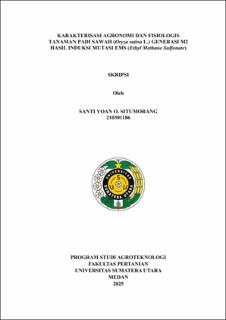Karakterisasi Agronomi dan Fisiologis Tanaman Padi Sawah (Oryza sativa L.) Generasi M2 Hasil Induksi Mutasi EMS (Ethyl Methane Sulfonate)
Agronomic and Physiological Characterization Of M2 Generation Rice Plants (Oryza sativa L.) Induced by EMS (Ethyl Methane Sulfonate)
Abstract
Rice is the main staple food crop in Indonesia, but its productivity can be
hindered by limited water availability, so efforts need to be undertaken to improve the characteristics of superior varieties that are more adaptive to drought conditions. One of the approaches that can be taken is through mutation breeding using EMS (Ethyl Methane Sulfonate). This research aims to evaluate the agronomic and physiological characteristics of M2 generation rice plants resulting from EMS mutation induction. The study was conducted at experimental field and Biotechnology Laboratory of the Faculty of Agriculture, Universitas Sumatra Utara from December 2024 to April 2025. This study used 4 treatments, namely: Control Inpari 32, Mutant Inpari 32, Control IR64, and Mutant IR64 with 20 sedlings per treatment and 10 seedlings planted in each tub. The drought stress treatment for 1 week was conducted at the rice plants, 10 weeks old after planting. Observation variables included seedlings growth, plant height, number of leaves, leaf colour, number of tillers, flowering age, number of productive tillers, leaf rolling score, chlorophyll content, harvest age, number, weight, and length of panicles, weight of filled grains, and percentage of filled and unfilled grains. Data were processed using Microsoft Excel and presented descriptively. The results of this study show that the Inpari 32 mutant has superior characteristics over the control at the variables: leaf colour, number of tillers, content of chlorophyll A,
panicle number, and leaf rolling score. Meanwhile, the IR64 mutant has superior characteristics over the control at the variables:number of tillers, number of productive tillers, content of chlorophyll B and total chlorophyll, leaf rolling score, panicle number, and percentage of filled grain weight. The Inpari 32 and IR64 mutants have leaf rolling scores classified as very tolerant (0) and tolerant (1) and the IR64 mutant has a lower percentage of empty grain weight compared to the control, indicating better drought resistance.
Collections
- Undergraduate Theses [3569]

